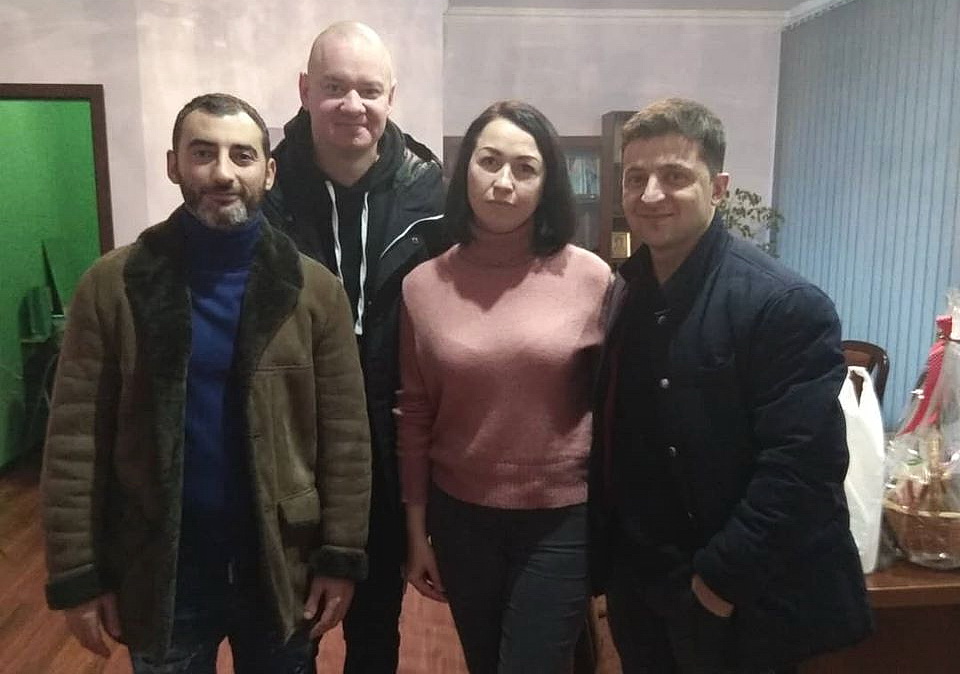The Ukrainian film community had no doubts about who should be the next head of the State Film Agency. But then they got a surprise.
Julia Sinkevych was an obvious frontrunner. With over 10 years of experience in the industry, she is the general producer of the Odesa International Film Festival, Ukraine’s largest film festival, the co-founder of the Ukrainian Film Academy and a member of the European Film Academy, the Ukrainian Oscar Committee and the National Union of Cinematographers.
By all appearances, she was the perfect candidate to continue the boom in Ukrainian cinema that started under the agency’s previous head in 2014. Members of the film community wrote a public letter in support of her candidacy and addressed it to the government.
But on Jan. 31, a different person was chosen for the job: Marina Kuderchuk. She also has 10 years of experience, though, notably, it was in a tax office and unrelated to film.
The appointment sparked a scandal when the public discovered that Kuderchuk had very little film-related experience, but was publicly supportive of President Volodymyr Zelensky. It led critics to suggest that she got the job through her connections.
Kuderchuk didn’t answer the Kyiv Post’s request for comment. In interviews with other media, she denied that cronyism played a role in her appointment and said she wanted to develop Ukrainian cinema with “honest and transparent rules for everyone” and improve its distribution and promotion in Ukraine and abroad.
Her film expertise amounts to less than three years as the deputy director and then as the director of a municipal cinema in Zaporizhia, a city of 738,000 residents some 550 kilometers southeast of Kyiv. She also co-organized the little known Zaporizhia International Film Festival in 2017.
Since November, she has worked as the deputy head of the Zaporizhia Regional State Administration — a whole three months including the Christmas holidays.
Adding to suspicions she got her new job for supporting Zelensky are a series of photos. One depicts her with the actor-turned-politician in 2018, months before he announced his run for president.
Revival Under Illienko
The State Film Agency that executes Ukraine’s filmmaking policy was without a leader for five months. The former head, Phillip Illienko, a producer from a family of filmmakers and a member of the nationalist Svoboda party, resigned in August, saying he had achieved his mission of “reviving Ukrainian cinema.”
The film community largely agrees with that claim. In the five years of Illienko’s leadership, the number of Ukrainian feature film releases increased from eight in 2014 to 41 in 2019, according to the State Film Agency. The Agency funded four of these in 2014 and 29 in 2019. State funding increased from Hr 63 million ($5.3 million at the 2014 exchange rate) to Hr 505.9 million ($19.57 million in 2019).
Filmmakers competed for state funding in transparent pitch meetings organized and broadcast live by the agency. They could get money to fund up to 100 percent of the film’s costs, but usually the rate was around 50 percent or less. The filmmakers aren’t required to return the funding.
The scales were tipped in favor of patriotic films, leading to some jingoistic distortions. Illienko’s agency was also criticized for leniency toward inexperienced filmmakers — even when their projects failed, they still got financing at the next pitch.
Most projects did not pay off financially: In the four years of Illienko’s leadership, Ukrainian films made Hr 357.67 million ($14.42 million), which is six time less than what the agency spent on them.
But the industry grew and got better. The films’ cultural importance is also hard to measure, especially during Russia’s hybrid war against Ukraine.
Through sheer quantity, the agency accustomed Ukrainians to watching more Ukrainian-made movies. While in 2014 only a little more than 2% of films screened in Ukraine’s cinemas were made domestically, in 2019 the figure was almost 9%. And the quality improved too: In five years, 28 Ukrainian movies made it to world-class film festivals.
While the patriotic films half-financed by the state didn’t turn a profit, a few partly-financed comedies had surprising success. The highest-grossing film was “Ya, Ty, Vin, Vona” (“Me, You, Him, Her”). With a budget of Hr 36.9 million ($1.5 million), 49% of which was provided by the state agency, this romantic comedy made Hr 71.1 million ($2.89 million) in Ukraine.
Fun fact: “Ya, Ty, Vin, Vona” co-starred and was produced by Zelensky and his Kvartal 95 Studio in 2018. After a successful run in theaters, the team transferred to the State Film Agency its share of the profits – Hr 11.67 million ($474,790).
It was at the premiere in Zaporizhia that the new State Film Agency Head Kuderchuk took the photographs with Zelensky.

Julia Sinkevych (L), general producer of the Odesa International Film Festival, takes a selfie with Ukrainian actress Irma Vitovska (C) and Anna Machukh, executive director of the Ukrainian Film Academy in Kyiv on April 19, 2019. Sinkevych is widely respected by the Ukrainian film community and was considered a perfect candidate to head Ukraine’s State Film Agency. (Facebook / Anna Machukh)
Rejection of Sinkevych
The competition to replace Illienko started in October, over a month after he resigned. Thirteen candidates applied for the position, including Sinkevych, Kuderchuk and Oleksiy Kiryushchenko, a writer and actor who played Zelensky’s father on the “Servant of the People” TV Show.
The first two rounds of the competition were computerized tests on English, Ukrainian law, situational thinking and leadership. Kuderchuk and Kiryushchenko did not pass the first round. After the second round, Sinkevych had the highest score and was the only remaining candidate.
But things turned sour at the third and penultimate round, when Sinkevych was interviewed by the members of the National Agency for Civil Service, a body without film specialization that evaluates candidates for government jobs.
The video of the interview is available online: Answering the commission’s questions, Sinkevych presents her knowledge of the industry, outlines her plans for its development and explains that she will motivate the agency’s underpaid employees with “professional growth.”
Two out of four anonymous members of the commission gave Sinkevych zeros in almost every category. The other two gave her only positive marks. As a result, Sinkevych was rejected for failing to earn the required minimum score.
“The competition for the post of State Film Agency head was a farce. The agency and Ukrainian cinema are again in a dramatic and crisis situation,” Illienko, the former head, wrote of the rejection.
Sinkevych sued the National Agency for Civil Service to appeal its decision. Over a hundred members of the film community protested and demanded that the agency review the results of the interview. Individual filmmakers and Ukrainian film associations demanded the same in an open letter to the president, prime minister and culture minister.
But there was no answer, Sinkevych says. She is now waiting for her court hearing to begin, but says she doesn’t expect it to help.
“I think we have enough evidence to appeal the decision of that interview. But it probably won’t affect the appointment (of Kuderchuk) since it was under a new competition,” Sinkevych told the Kyiv Post.

Maryna Kuderchuk (C), the now-head of the State Film Agency, poses for a photograph with Volodymyr Zelensky (R) and his business partners in Zaporizhia in 2018, months before the actor and producer announced his run for the presidency on New Year’s Eve. The photo has led to speculation that Kuderchuk was appointed as a candidate loyal to the president and his government. (Facebook / Maryna Kuderchuk)
Kuderchuk’s appointment
As Sinkevych was the only remaining candidate when the academy rejected her, the government announced a new competition in November. But Sinkevych refused to compete, saying it would mean she recognized the legitimacy of the commission’s earlier decision.
Ten candidates applied for the new competition, including Kuderchuk. While only Sinkevych made it to the third round of interviews in the first competition, this time, five candidates passed and were interviewed by the culture minister and other cabinet members.
“The government appointed Marina Kuderchuk as the Head of the State Film Agency,” Minister of Culture Volodymyr Borodiansky announced on his Telegram channel on Jan. 29 without further explanation.
Film critics, journalists and members of the film community first expressed confusion. Almost nobody knew much about Kuderchuk.
Confusion turned to outrage when information about Kuderchuk’s limited experience and sympathies toward Zelensky began to surface. Observers said that she was appointed as a candidate loyal to the president and his government.
Kuderchuk later told journalists that she is “equally distant” from all political parties and that she has no curator in “high-level offices.” She said that her experience in the film industry was “quite intensive” and asked the public not to criticize her before she had a chance to demonstrate results. She said she met Zelensky only once when that photo was taken.
“We organized a presentation (of Zelensky’s film) and, yes, took pictures. We interact with different people at movie events, maybe take pictures. That’s normal,” Kuderchuk told the RFE/RL news website.
Journalists also found that when Kuderchuk was the deputy director of the municipal cinema in Zaporizhia, the theater cancelled the screening of the Ukrainian film “Chervonyi” (or “Escape from Stalin’s Death Camp” in English) on Ukraine’s Independence day, and, in September 2017, the cinema removed the film “The Secret Diary of Simon Petliura” from its roster. Both films are about Ukrainian nationalist leaders and were half-financed by the State Film Agency as “patriotic”.
Back in 2017, Kuderchuk told local media that the screening of “Chervonyi” on Independence Day took place after all, and said that the cinema only limited screenings of the two films due to low demand.
“We released ‘Chervonyi’ to screen twice. And on the first day of the release of ‘Petliura,’ the facade of the cinema was doused with red paint… The film was not screened that release day, but then it was shown,” Kuderchuk told RFE/RL.
While many in the film community say they are disappointed by Kuderchuk’s appointment, Vladimir Yatsenko of the Film Industry Association of Ukraine says he doesn’t know what to expect from the new agency head.
No matter who leads the agency, Yatsenko adds, the film industry will self-regulate if the new comprehensive reforms in state film policy start to work. They include the introduction of personal ratings for filmmakers in the pitching process. Political will is required to implement it, Yatsenko says.
Asked whether the appointment of Kuderchuk is a sign of such political will, Yatsenko says he’s not sure.
“I think it’s rather a product of political battles, not political will.”
